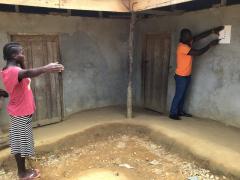Dubai Cares Kicks Off A 3-Year School Health Program In Liberia To Tackle Deworming And Eye Health Needs For School-Aged Children

Dubai Cares, part of Mohammed bin Rashid Al Maktoum Global Initiatives, has announced a three-year integrated school health program in Liberia to tackle deworming and eye health needs for school-aged children. The AED 7,347,000 (USD 2 million) program, in partnership with Sightsavers, is set to benefit around 77,000 children aged 6-18 years old in four regions across Liberia.
The program is an integrated school health system that seeks to support Liberia’s health system in the aftermath of the Ebola outbreak. The program provides marginalized children in four regions of Liberia with basic vision screening and deworming and then facilitates the referral and treatment process for children identified with visual impairment. As part of this, the program is set to train 2,400 teachers from 1,200 schools, as well as community volunteers and District Education Officers in an effort to build skills so they can carry out the deworming and vision screening. In addition, the program is set to train four Optometric Technicians – one per region – and provide a minimum of 3,000 pairs of high-quality eyeglasses to children and teachers identified with visual impairment
Commenting on the importance of this program, Annina Mattsson, Programs Director at Dubai Cares said: “Liberia’s economy is highly vulnerable to external shocks and natural disasters, and the recent Ebola outbreak has put an enormous strain on the country’s health and education systems. With this new program, Dubai Cares is reaching out to vulnerable children in the most affected areas, and we are placing schools at the center of the strategy to deworm children and provide a healthy environment for education. Over a period of three years, this program will positively contribute towards the delivery of Sustainable Development Goals (SDGs) targets such as universal primary and secondary education, gender equality and inclusion, as well as universal health coverage.”
Adoley Sonii, Country Director for Sightsavers in Liberia said: “Health issues related to visual impairment and intestinal worms are known to contribute to absenteeism and drop-out rates amongst school age children in Liberia. Our integrated school health program, working closely with the Ministries of Health and Education, tackles these issues through school-based deworming and vision screening activities. We are delighted to partner with Dubai Cares in this program to make a significant positive impact in the lives of children and help them pursue their education”.
Liberia is one of the world’s least developed countries, ranked 181st out of 189 countries in the UNDP’s (United Nations Development Programme) 2018 Human Development Index. It is considered a lower-middle income country with a small open economy that is highly vulnerable to external shocks and natural disasters. With the majority of its population working in agriculture, the country’s agricultural production is highly affected by diseases that constitute a serious public health problem and fuel poverty, morbidity and mortality, and causing three quarters of its population to live on less than a dollar a day. The West African country faces great challenges in the field of education, with a mean average of 4.4 years of schooling per child, and 21% of children not completing primary education according to a 2017 UNICEF report.




